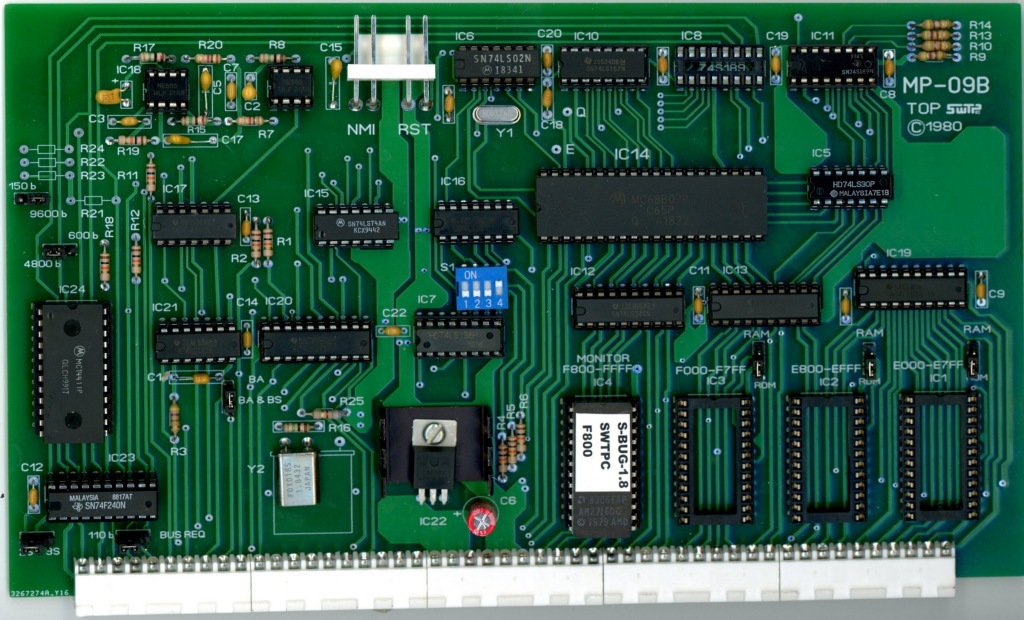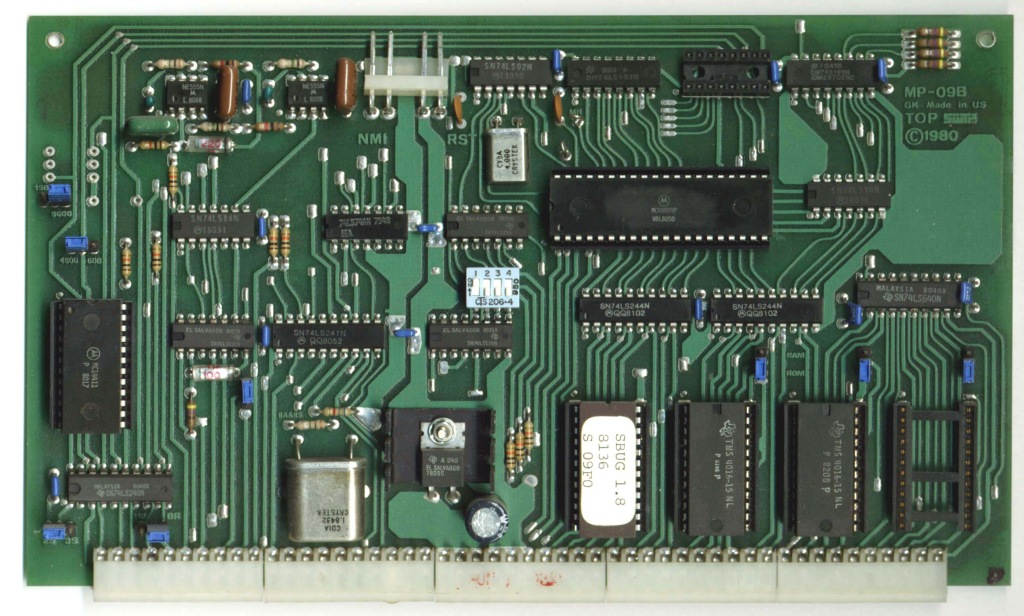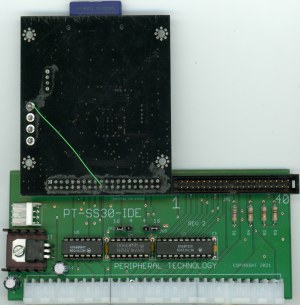
This is the latest MP-09 Reproduction CPU. A toggle switch has been added to allow switching between the upper and lower half of a 2732 EPROM. This allows switching between SBUG/FLEX and OS9 with the flip of a switch. Without this change it was necessary to change EPROMs to switch between FLEX and OS9.

This is the first reproduction. It is no longer stocked but could be produced by special order.

For comparison here is an original SWTPC MP-09 board. By now SWTPC was using solder masks, but the quality was poor and solder would run under the solder mask The precision of the solder mask was poor, and it was easy to bridge adjacent IC pads when hand soldering the board. The SWTPC board is not silk-screened.

The MP-09B is a close reproduction of the SWTPC MP-09 SS-50 processor board. There are only minimal changes to the layout.
Differences between the Original and Reproduction:
The design of the MP-09 was not changed. The reproduction incorporates the latest changes made by SWTPC that I was able to find. SWTPC boards often had jumper wires installed. On the reproduction the jumper wiring changes were made to the PCB traces so no jumper wires would be needed.
The assembled board includes a modified S-BUG monitor. It is currently marked V1.82 and includes a command to boot from the PT-SS30-IDE board.
MP-09B Versions:
The MP-09B can be ordered in several versions. It can be ordered in both 1 MHZ and 2 MHZ clock speeds. It can be ordered to support extended addressing. When this option is selected the MC14411P is deleted. A 74S189 is installed at U8, and a few resistors are installed. With the option to support extended addressing, you need a motherboard that has baud rate generation on it. For SWTPC that would be the MP-MB motherboard. There were other makers of MB's with baud rate generation as well. Peripheral Technology makes the MP-B2R and MP-B3R motherboards that have baud rate generation on the motherboard. There is probably little use for addressing >64K unless you are planning to run UNI-FLEX or OS9 Level 2. At the time of this writing I have not been able to locate an L2 version of OS9 for the SWTPC system, although I see some references to it in a few places. Until an SWTPC DMAF style of floppy controller is replicated, UniFlex is not an option since it requires a DMA floppy controller. It won't run on a DC1, DC2, DC3, DC4, FD2 or FD2A floppy controller.
Considerations for running at 2.0 MHZ:
Although SWTPC released a few tech notes on running at 2.0 MHZ, they did not give a comprehensive guide on how to convert from 1.0 to 2.0 MHZ. In general you need memory boards with 250ns or faster memory and a floppy disk controller that will support a fast bus operation like the FD2 or FD2A. Serial cards need to have an MC68B50 chip. For IO cards it may be possible to select the slow IO setting, if your motherboard has this option.
The configurations tested for running at 2.0 MHZ contained these boards: MP-B3, MP-B2R, MP-B2 modified for 16 address IO and 6809 addresses, Peripheral Technology MP-09B at 2.0MHZ, PT-SS50-64K memory board, a custom made board containing 2 512Kx8 70ns RAM chips, FD2, FD2A, and a Digital Research 64K memory board with 6116's 200ns chips. MP-S with MC68B50, Corsham serial board with MC68B50 also are options. Software can be an issue as some disk drivers didn't have enough delay after writing a command to a register. After writing a command to the FDC, you have to wait a certain number of micro-seconds. This was usually created by a software timing loop. If you have software with 1MHZ timing loops troubleshooting the system can be maddening. A few sectors can load properly and others don't load at all. It's not really apparent why the system is not working. FLEX from SWTPC, assuming it is a later release, and OS9 will not have this problem. Don't forget that some early disks might not boot properly or at all in a 2.0 MHZ system because the boot code on the disk also contains the wrong software timing loop for 2.0MHZ.
Floppy Emulator:
With good floppy drives hard to come by, to say nothing of blank diskettes, an alternative is needed. A GoTek drive with Flashfloppy Firmware update is capable of reading and writing disk formats as used by FLEX and OS9 . The GoTek uses USB memory sticks to store images of floppy disks and can hold thousands of disk images on a single USB stick. The images can be emailed as well as downloaded over the internet.
A GoTek allows users to download DSK image files from the FLEX users group, and there is a PC utility program to convert these image files to .IMA format used by the GoTek unit. Originally GoTeks had to have their firmware reflashed with Flashfloppy Firmware, and it was necessary to add an OLED screen in order to tell which image you selected and to see error messages. It is no longer necessary to buy a GoTek and immediately modify it. Fortunately you can purchase ready to use GoTeks. GoTeks are now available with FlashFloppy Firmware and OLED displays; in addition they use a rotary knob to select images. This is a big improvement over the up and down push buttons that were on the original units.
You may use a real floppy drive with a GoTek should you have a need to read or write real diskettes.
This is a GoTek with Flashfloppy Firmware and OLED. These units can be purchased on EBAY for under $50. Currently these units are not available on AMAZON. The units for sale on AMAZON do not have the OLED and Flashfloppy Firmware.

OS9:
To run OS9 on the SWTPC you need memory from 0000-DFFF, a PT146818 clock board, and an FD-2 or FD2A floppy controller. You will need OS9 Boot ROMs. These can be downloaded from the download section. To transfer your downloaded software to the SWTPC you will need need at least one GoTek. It is highly recommended to use a PT-SS30-IDE instead of a second GoTek/floppy drive. . You would have to have either a second GoTek/floppy drive or mass storage on the IDE controller in order to be able to use OS9. It is recommended to use a IDE/SD adapter for your mass storage. These adapters are inexpensive and use low cost SD memory cards.
SD/IDE adapters are sold on AMAZON and EBAY. As long as they look like the one below, it should work. I have purchased many units from many different sources, and they all appear to be identical.

The SD/IDE adapter board will plug into a PT-SS30-IDE board. The top of the SD/IDE adapter will clear the case of a SWTPC computer.

FLEX for the SWTPC:
Flex V3.01 has been ported to the SWTPC. FLEX V3 was the last version of FLEX developed by TSC. FLEX 3.0 is compatible with the versions of FLEX sold by SWTPC for the 6809. FLEX 3.0 was available for both the 6800 and 6809. The download section contains a GoTek boot image for V3.01. You may boot from this GoTek image and then FORMAT and COPY FLEX to an SD memory card. It is then possible to boot from the SD image. The SD card supports 256 partitions and partitions can be up to 16MB in size. Flex supports up to four drives, and there is a utility that allows mapping of any partition to FLEX's 4 drive numbers. You will need SBUG 1.82 and the WDISK ROM. Both can be downloaded from the Download section. The .IMG.cfg configuration file is needed for the GoTek and should be copied to any USB memory stick used in your GoTek. Both FLEX and OS9 can reside on the same SD memory card. The first 4GB of space is reserved for FLEX, and OS9 starts at 4GB and extends to the rest of the SD.
FLEX and OS9:
Generally you will need to change boot EPROMs when switching between SBUG/FLEX and OS9. If you have our reproduction board with the toggle switch in the top left corner, you can switch between SBUG and OS9 by flipping the switch. In this case a 2732 EPROM is used in place of a 2716. Half of the EPROM contains SBUG and the other half contains the OS9 Boot. There are some who have made the modification to use 2732s in an MP-09 in order to switch between different operating systems. Should you have one of these modified boards, you may also dual boot FLEX or OS9.
Downloads
Hardware Manuals:
MP_09B_AssemblyInstructions.pdf Original SWTPC MP-09 instructions
MP_09_SchematicLeft.jpg Original SWTPC Schematic - Left Half
MP_09_SchematicRight.jpg Original SWTPC Schematic - Right Half
SD quick start Quick start guide FLEX/OS9 from SD
Flex Installation Installation Guide - FLEX to SD
OS9 Installation Installation Guide - OS9 to SD
PTMONUserV1.6.pdf PTMON V1.6 User Manual
EPROMS - SBUG - PTMON
SBUG1.82-PTIDE-F800-FFFF.BIN SBUG V1.82 with support for PT-IDE Controller
PTMON6-2716.BIN F800-FFFF PTMON for SWTPC, Use in place of SWTBUG
WDISK-SWTPC-E800-EFFF.BIN The hard disk drivers to be used with the above SBUG.
Source Code - SBUG - PTMON
SBUG.ASM S-BUG 1.82 Source with IDE Boot Command
PTMON6.ASM PTMON V1.6 Source Code
WDISK.TXT IDE Driver Source
GoTek Utilities:
FloppyMaintenanceSetup.zip This Windows program can convert .dsk to .ima formats. Import and export files. Move files from one .ima image to another by use of import and export.
Click Here GoTek IMG.CFG File The configuration file you need for your GoTek to support FLEX/OS9 formats. UnZip and place on your USB memory stick.
GoTek Images - FLEX:
If you had downloaded disks with the updated 5/25/24 tag, Please download the updated versions. The older version has many problems.
FLEX 3.01 Updated 6/22/24 FLEX Boot Disk - IDE support - 80 TRK
FLEX 3.01 Source Updated 6/22/24 Flex 3.0 Source code for SWTPC - 80 TRK
FLEX Installation Instructions to transfer FLEX 3.0 Boot disk to SD
FLEX291.IMA GoTek image, SWTPC FLEX 2.91 BOOT DISK - NO IDE support
SD Card Images:
UnZip these images and copy to a SD card. One program that will copy from a file to SD is Win32DiskImager. It can be obtained here - https://win32diskimager.org/ . The format of the SD card is not compatible with a PC. The file contains a raw image that is written to the SD card starting with LSN 0. The resultant SD card does not have a PC compatible file structure. You cannot examine the SD card using file manager on your PC. Your PC may even prompt you to format the SD after imaging the SD. Don't format it. The SD is ready for use in a SWTPC system.
When inserting an unformatted SD or one that has been imaged with FLEX/OS9 your PC will ask it you want to FORMAT the SD. Don't FORMAT, ignore all the warnings and start Win32DiskImager.
FLEX 3.0 8-1-24 Image The first 10 FLEX partitions. Does not contain OS9. This SD is bootable and contains all the content on the SD card that is shipped with a SS30-IDE.
FLEX-OS9 8-1-24 Image Full image of FLEX and OS9. This will produce the same SD that ships with a SS30-IDE. FLEX and OS9 are bootable. Requires a 32GB or larger SD.
Software Manuals - FLEX:
FLEX 6809 User's Manual.pdf FLEX 9 User's Manual
FLEX 6809 Advanced Programming Manual.PDF You need this if you want to write programs.
ASMB6809.PDF FLEX 6809 Assembler Manual
XBASIC.PDF TSC XBASIC User Manual
BASIC.PDF TSC BASIC User Manual
INTROL-C.pdf Introl C User Manual
OS9
OS9 Manuals:
OS9 Users Manual.PDF OS9 User's Manual 1983
OS9 System Programmers Manual.PDF OS9 System Programmers Manual 1983
OS9 Assembler Manual.PDF OS9 Editor, Assembler and Debugger Manual
OS9 Basic09 Manual.PDF OS9 Basic Users Manual
OS9 C Compiler Manual.PDF Microware C Compiler User Manual
OS9 Scred Users Guide.PDF Full screen editor for OS9
EPROMS - OS9 Boot:
Copy each file to a 2716. Both are needed to boot OS9
Some MP-09's were modified to allow for 2732 EPROMs and switch to select either the lower or upper half of the EPROM. If you have a modified MP-09 or one of the later Reproduction MP-09's with a toggle switch on the top left corner of the board, you can select between OS9 and SBUG by the switch rather than having to swap EPROMs.
Combined SBUG and OS9 Boot ROMs:
Some MP-09's were modified to allow for 2732 EPROMs and switch to select either the lower or upper half of the EPROM. If you have a modified MP-09 or one of the later Reproduction MP-09's with a toggle switch on the top left corner of the board, you can select between OS9 and SBUG by the switch rather than having to swap EPROMs.
These images are programmed in a 2732. Install both ROMs
SBUG-OS9-F800 Place in the F800-FFFF socket.
SBUG-OS9-E800 Place in the E800-EFFF socket.
GoTek Images - OS9:
Boot image for OS9 OS9 Boot Image - 80 trk
OS9 Installation Installation Guide - OS9 to SD
| MP-09B-1 MHZ | Assembled and Tested 1 MHZ board - Includes S-BUG-1.82 - Specify for extended memory - deletes MC14411 | $99 |
| MP-09B-2 MHZ | Assembled and Tested 2 MHZ board - Includes S-BUG-1.82 - Specify for extended memory - deletes MC14411 | $119 |
| Bare MP-09B | Bare MP-09B Board - No Boot ROM | $25 |
| PT-SS50-64K | 64K memory board - 120ns or faster, 56K usable for SWTPC/6809 systems | $39 |
| PT-SS30-IDE-32GB | PT-SS30-IDE board, with SD memory to IDE adapter, 32GB memory card and FLEX/OS9 preloaded and ready to boot. This is to be used with a PT-MP-09 board with the toggle switch at the top. All boards now ship with the toggle and 2716/2732 selection. This option must be ordered at the same time as a MP-09 board | $60 |